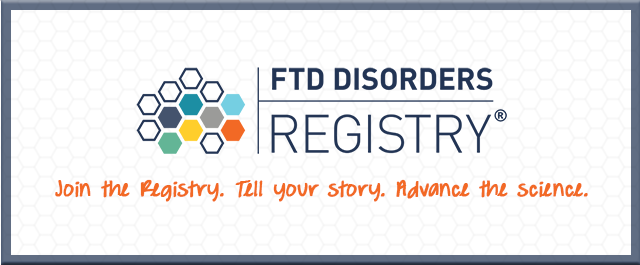PRESS & NEWS
FTD Disorders Registry Presents Posters at 2 Conferences in 2021

The FTD Disorders Registry had two abstracts accepted as poster presentations and thus participated in two dementia research conferences this year.
The FTD Disorders Registry had two abstracts accepted as poster presentations and thus participated in two dementia research conferences this year.

Dr. Dianna Wheaton
The first gathering, Promoting Diverse Perspectives: Addressing Health Disparities Related to Alzheimer’s and All Dementias, was held virtually in June 2021.
The second, the Alzheimer’s Association International Conference® (AAIC®) 2021, was a hybrid event in July with about 1,000 people in-person in Denver, Colorado, and more than 11,000 people joining online.
“Scientific presentations provide the opportunity to share detailed data with professionals in the FTD and dementia communities,” said FTD Registry Director Dianna Wheaton, MS, Ph.D., CHES. “This was the first time the Registry presented at either of these two conferences.
ADDRESSING HEALTH DISPARITIES
In 2020 the Registry conducted a Minority Engagement Survey to explore best practices for the outreach and engagement of minority populations with a digital and remote focus. The results were summarized in a Minority Engagement Report (MER).
Dr. Wheaton presented the results as a poster with a three-minute video for the Addressing Health Disparities conference. This annual meeting is hosted by the Alzheimer’s Association and sponsored by the National Institute on Aging (NIA).
The report outlines barriers to and suggested practices for minority engagement as identified in the literature and through input provided by leading members of organizations across a variety of industries. The Registry also has used the data to create a multi-phased strategic plan for engaging, recruiting, and retaining a more inclusive and diverse population of individuals who are impacted by frontotemporal degeneration (FTD).
This conference explores disparities in the prevention, diagnosis, and treatment of Alzheimer’s and other dementia, while connecting early career and senior investigators to valuable networking and mentorship opportunities. It also seeks to support health equity in research and encourage collaboration across the dementia science field.
“Since its inception, the Registry has sought to represent all members of the FTD community, regardless of race, ethnicity, or socioeconomic status,” Dr. Wheaton said. “We seek to ensure that all individuals impacted by FTD have the opportunity to participate in the research process.”
Current and former Registry staff who assisted in developing the survey, conducting interviews, writing the report, and preparing the presentation included Dr. Wheaton; Sherry Harlass, BA, Communications Manager; Lauren Youngborg, MS, CGC, former Projects Manager; Sweatha Reddy, BS, ALLFTD Liaison; and Lakecia Vincent, MPH, former Registry Manager.
AAIC>21
Data from the Registry’s Disease Impact Survey was compiled to help AAIC attendees understand the lived experience of persons affected by FTD including those diagnosed, their families, and caregivers.
The Disease Impact Survey was designed to characterize person-centric perceptions of FTD disease manifestation and the impact to those diagnosed and others. This survey is completed by those who join the FTD Registry and choose to participate in research.
The anonymous data included in the poster were participant demographics, FTD diagnosis, symptoms and their onset, and disease impact on daily life.
The FTD Registry was one of 3,000 scientific presentations at AAIC 2021, which included plenary sessions, scientific sessions, corporate symposia, exhibits, and posters. Because it was a hybrid event, the Registry prepared an online poster and three-minute video presentation, and Dr. Wheaton traveled to Denver and discussed the results with those who attended the conference in-person.
AAIC is the world’s largest gathering of researchers from around the world focused on Alzheimer’s disease and related dementias (ADRD). The conference is part of the association’s research program.
“Learning more about the lived experience from persons diagnosed, their families and caregivers provides insight into the diagnostic journey and helps researchers and clinicians apply this information,” Dr. Wheaton said.
“I am grateful for all who completed this survey as part of their participation in the Registry,” she added.
Persons who contributed to the development of the survey, poster, and presentation, included current and former Registry staff Dr. Wheaton, Mrs. Harlass, Mrs. Reddy, Mrs. Vincent; and Nadine Tatton, Ph.D., Director, Medical Affairs with Alector, Inc., who contributed while an employee of the Association for Frontotemporal Degeneration.
Together we can find a cure for ftd
The FTD Disorders Registry is a powerful tool in the movement to create therapies and find a cure. Together we can help change the course of the disease and put an end to FTD.
Your privacy is important! We promise to protect it. We will not share your contact information.



